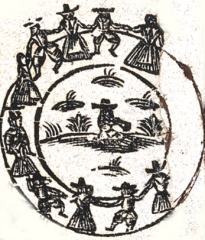1636 book illustration 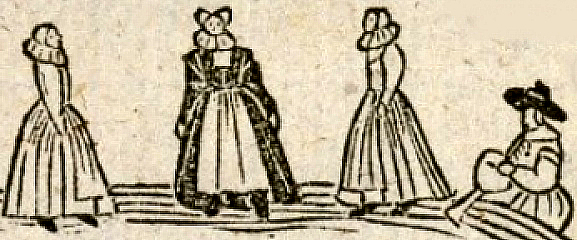 |
mid 1590s 'Love's Labour's Lost' by William Shakespeare, (Act v. Sc. i) Dull says :
" I'll make one in a dance or so ; or I will play upon a tabor to the worthies,
and let them dance the hay." |
1605 THE RIGHT HONOURABLE CHARLES, EARL OF NOTTINGHAM, Lord High Admiral of England,
His Highness's Ambassador to the King of Spain : report of the journey:
 The Harleian Miscellany : or, A collection of scarce, curious, and entertaining pamphlets and tracts, as well in manuscripts as in print, found in the late Earl of Oxford's library; interspersed with historical, political, and critical notes
by Oldys, William; Malham, John, 1808 The Harleian Miscellany : or, A collection of scarce, curious, and entertaining pamphlets and tracts, as well in manuscripts as in print, found in the late Earl of Oxford's library; interspersed with historical, political, and critical notes
by Oldys, William; Malham, John, 1808 |
1610 the churchwarden of Farleigh Hungerford, Somerset, was criticised:
“Нее being a churchwarden is a common player att bowles on the sabbaoth day and that hee is a keeper of brawling
& swearing companie and minstrelsye & dauncing in his howse & daunceth himself on sabbaoth & holye dayes” |
1610 the vicar of Bisley, Gloucestershire, made his son lord of the Whitsun maypole; there was music and dancing
for the young people. “Piping and dancing at a maypole and keeping of summerale”, the vicar preached, were as
lawful as hearing the word of God.
‘Revel, riot, and rebellion : popular politics and culture in England, 1603-1660’ by Underdown, David, 1985 |
1615 In November William Harrison, his wife Isabella, and John Gowling were presented before archdeacon
at Barnard Castle, County Durham – the latter for piping and “those two dauncing upon the saboth.”
Theatre, Catholic Communities, and Popular Entertainment in England’s North-East, c.1600-1625 by Gašper Jakovac |
1617 Lancashsire; Popular revels were certainly encouraged by many of the county élite. There was 'piping
and dancing' near the church
King James I was attending, He went on to a ‘rushbearing and piping’, followed
by country dances, at the house of
his host, Sir Richard Houghton.
‘Revel, riot, and rebellion : popular politics and culture in England, 1603-1660’ by Underdown, David, 1985 |
1629-31 Nunwell House, Hampshire:
"…this Mistris woorseley and Mistris Milles weare to handsome tale proper women, and they woold Dawnce
aftor a poore Tabor and pipe from hasely howse to ye foote of ye hill...”
Sir John Oglander's Notes and Accounts, f29v |
1631 Leek, Staffordshire;
“Joan Swyndon - for entertayning of divers persons into her house who have prophaned the Sabboth
by gamninge pipinge and dauncinge”
Archdeaconry of Stafford Visitation Act Book |
1631 Rushton, Staffordshire;
(Against) Richard Slack and Francis Miller
“for entertayninge of divers persons into their houses who have prophaned the Sabboth
by gamninge pipinge & dauncinge”
Archdeaconry of Stafford Visitation Act Book |
1631 Richard Brathwaite wrote a satire on pipers in 'Whimzies':
"… the Flute and the Tabor and such other like things are not to be condemned, simplie of their owne nature:
but onelie in respect of mens abusing of them, for most commonlie they perverte the good use of them:
For certainlie, the doth not sooner sound to make men merrie, but … men are so caried awaie,
as they cannot sport themselves with moderate mirth, but they fling themselves into the aire, as though
they would leape out of themselves. This then … [is] a cursed mirth … that God condemned...." |
1633 criticism written by William Prynne, 1600-1669. [Ed - 'pipes,' 'pipers' 'fidlers' and 'tabers' may include pipe and tabor players here]
Page 249
“…then he leaped out suddenly with a great noyse of Pipes and Fidlers clad in a womans Gowne, and a long coate,
and having danced out a dance…”
Page 631
“…Concilium Rhemense, Anno 1583. Which condemnes the use of Stage-playes and dancing, especially on
Lord-dayes, holy-dayes, and the Christmas season, when they are most in use, under paine of excommunication…”
Page 634
“…The people are prohibited to exercise prophane assemblies, and riotous feasts, dances, morrices, disguises
and Stage-playes on Lords dayes and holy dayes: to exhibit shewes or pompes of musicall instruments and tabers
in the processions of images through the streetes and crosse wayes:…”
quotes from 'Histriomastix The players scourge, or, actors tragædie, divided into two parts. Wherein it is largely evidenced,
by divers arguments, by the concurring authorities and resolutions of sundry texts of Scripture ... That popular stage-playes ...
are sinfull, heathenish, lewde, ungodly spectacles, and most pernicious corruptions; condemned in all ages, as intolerable
mischiefes to churches, to republickes, to the manners, mindes, and soules of men. And that the profession of play-poets,
of stage-players; together with the penning, acting, and frequenting of stage-playes, are unlawfull, infamous and misbeseeming
Christians. All pretences to the contrary are here likewise fully answered; and the unlawfulnes of acting, of beholding
academicall enterludes, briefly discussed; besides sundry other particulars concerning dancing, dicing, health-drinking,
&c. of which the table will informe you.' by William Prynne, an utter-barrester of Lincolnes Inne. |
 'Small books and pleasant histories : popular fiction and its readership in seventeenth century England' by Spufford, Margaret, 1982 'Small books and pleasant histories : popular fiction and its readership in seventeenth century England' by Spufford, Margaret, 1982
|
1649 Sir Kenelm Digby wrote in a letter “of tabors and pipes, and dancing ladies and convenient country houses”
Calendar of State Papers Domestic: Interregnum, 1649-50 Volume 3: November 1649 |
1655 "The examination of Richard Rowe, of Homisham in the county of Wilts, turner."
“… he observed a meeting of diverse gentlemen at the said mr. Willoughby's house, to hunt the fox,
which meeting continued for the space of a week, as he remembreth. He faith, they hunted the fox in
the day time, and danced in the night, having a fidler with them…”
A Collection of the State Papers of John Thurloe, Volume 3, December 1654 - August 1655. Originally published by Fletcher Gyles, London, 1742. |
1856
“…But we, when we dance, and do happen to sweat
Have a napkin in hand for to wipe off the wet;
And we with our lasses do jig it about,
Not like at Court, where they often are out
If the tabor play, we jump away,
And turn, and meet our lasses to kiss 'em…”
in 'Popular music of the olden time. A collection of ancient songs, ballads, and dance tunes' |
1664 court testimony:
“Elizabeth Styles, her confession of her Witchcraft January 26 and 30 and Feb. 7, 1664. before Robert Hunt Esqre…
The man in black sometimes plays on a pipe or cittern, and the company dances: at last the Devil vanisheth,
and all are carried to their several homes…”
‘The History of Witches and Wizards,’ etc., by W. P. London, 1700 (?) quoted in ‘The Devil in Britain and America’, by John Ashton, 1896, page 258 |
1671 Richard Baxter
1615-1691
wrote a criticism in a work entitled
‘The divine appointment of the Lords day
proved as a separated day for holy worship, especially in the church assemblies, and consequently the cessation
of the seventh day Sabbath : written for the satisfaction of some religious persons who are lately drawn into error
or doubting in both these points’
Page 117
“…Lords dayes, one of my Fathers own Tenants was the Town Piper, hired by the Year (for many Years together)
and the place of the Dancing Assembly was not an hundred yards from our door; and we could not on the Lords day,
er they read a Chapter, or Pray, or sing a Psalm, or Catechise or instruct a Servant, but with the noise of the Pipe
and Taber, and the Whootings in the Street, continually in our Ears;…when the people by the Book were allowed
to Play and Dance, out of publick Service time, they could
so hardly
break off their Sports, that many a time the
Reader was fain to stay till the Piper and Players would give over;…”
Page 124
But I will tell them that are the Teachers of the people, an honester way to Cure the peoples weariness,
than to send them to a Piper or to a Play to cure it. |
1671 poem
" My name is honest Harry:"…
"The fidler shall attend us,
And first play, John, come kisse me;
And when that we have danc'd a round,
They shall play,
Hit or misse me."
"Westminster drolleries, both parts, of 1671, 1672; being a choice collection of songs and poems, sung at court & theatres: with additions made by "A person of quality." |
1686 Roger Whitley's Diary 1684-1697
“…Laurison the fidler came, playd at dinner; afterwards 2 or 3 of them danced in the hall;…” |
before 1697
“…John Aubrey, English antiquary, writing before 1697, says:
‘Peasants danced to the tune of the pipe and tabor in the churchyard on Holy-Day-Eves’….”
Why Dance?: A Comprehensive Resource for Traditional Country Dancing, 2009
|
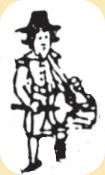 woodcut woodcut
playing for dancing |
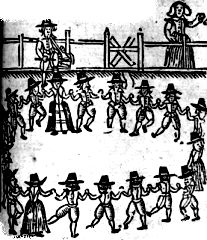 cover of the 1687 song collection 'The Country Garland' cover of the 1687 song collection 'The Country Garland'
Courtesy of the Pepys Library, Magdalene College, Cambridge, England. |
|
|
| |
dancing as part of folk customs |
| harvest home |
1661  quoted in 'Popular music of the olden time : a collection of ancient songs, ballads, and dance tunes, illustrative of the national music of England : with short introductions to the different reigns, and notices of the airs from writers of the sixteenth and seventeenth centuries : also a short account of the minstrels' by Chappell, W. 1859 quoted in 'Popular music of the olden time : a collection of ancient songs, ballads, and dance tunes, illustrative of the national music of England : with short introductions to the different reigns, and notices of the airs from writers of the sixteenth and seventeenth centuries : also a short account of the minstrels' by Chappell, W. 1859 |
| |
| haymaking |
| 1626 poem
“The Pipe and the Tabor is now lustily set on work, and the Lad and Lass will have no lead on their heels:”
1626 'Fantasticks' by Nicholas Breton. He takes the reader through the year, month by month, describing the Christian festivals in turn
and giving a keen insight into the life of country folk. |
| |
| procession |
1662 Prize Besom of Shaftesbury: the Burgesses of the town ask that the annual procession in May
should not take place on a Sunday.
"The said Mayor, accompanied with some of the Burgesses and other Inhabitants of the said Town and Borough,
have used to walk out into a Place called Enmore−Green, where is a Pool of
Water, and divers Springs and Wells;
and in that Place, to walk or dance Hand in Hand round the same Green in a long Dance, there being a Musician
or Tabor and Pipe, and also a Staffe or Besome adorned with Feathers, Pieces of Gold, Rings and other Jewells,
called a Prize Besom..."
'THE GOD OF THE WITCHES' by
Dr MARGARET ALICE MURRAY, page 93 |
| |
| maypole dancing |
1608 song by by Thomas Weelkes (1576 –1623) English composer and organist
being "noted and famed for a comon drunckard (sic) and notorious swearer & blasphemer"
“Strike it up Tabor and pipe us a favour,
thou shalt be well paid for thy labour:
I mean to spend my shoesole to dance about the Maypole,
I will be blithe and brisk, leap and skip, hop and trip,
turn about in the rout,
until very weary joints can scarce frisk...”
'Ayres of Phantasticke Spirites for three voices' |
Richard Baxter wrote of his childhood, around 1620,
describing what Sunday was like then.
“In the village where I lived, the reader read the common prayer briefly; and the rest of the day…
was spent in dancing under a maypole and a great tree where all the town did meet together…
We could not read the Scripture in our family [because of]
the great disturbance of the tabor and pipe, and noise in the street…” |
| First half of the 17th century:
“…At the Bodleian Library , … , the present writer found the Maypole - dance ( H ); with its primitive
perspective of street - architecture resembling our modern workmen's cottages, and the clear indication
of a prize - wreath for the Queen of the May, with the protecting stumps around the May - pole, and
the Tabourer with his pipe, calling the flat - capped ' Prentice - boys and the blithe damsels to a dancing
- bout . It is apparently of Charles the First's time…” [1600-1649]
1879 commentary on PHILLIP STUBBES'S ANATOMY OF THE ABUSES IN ENGLAND IN SHAKSPERE'S YOUTH , A.D. 1583, page 18 |
| 1633
“Mr. Prynn compiled and put in Print a Libelous Volume, Entituled by the name of Histriomastix against
Plays, Masques, Dancings, &c. …Mr. Prynn in his Book hath railed, not only against Stage-Plays, Comedies,
Dancings, and all other Exercises of the People, and against all such as behold them; but farther in particular
against Hunting, Publique Festivals, Christmas-keeping, Bonfires, and May-poles; nay, against the dressing
up of a House with Green-Ivy: and to manifest his evil and mischievous design in publishing of this Libel, he hath
therein written divers incitements, to stir up the People to discontent…”
Lord Chief-Justice Richardson's Sentence:
“…The Woman that singeth in the Dance, is the Prioress of the Devil, and those that answer are Clarks, and the Beholders are the Parishioners, and the Musick are Bells, and the Fidlers are the Minstrels of the Devil….”
John Rushworth, 'Historical Collections: 1633', in Historical Collections of Private Passages of State: Volume 2, 1629-38 (London, 1721) |
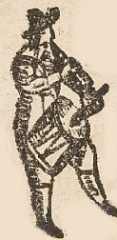 1666 ilustrating a ballad playing for maypole dancing 1666 ilustrating a ballad playing for maypole dancing |
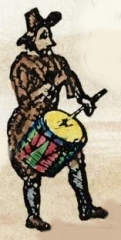 1680's copy 1680's copy |
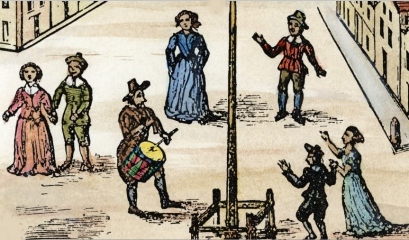 |
|
1671 poem in the Westminster Drollery, called the " Rurall Dance about the May-pole,
the tune the first figure dance at Mr. Young's ball, May 1671'
" Come lasses and lads, take leave of your dads,
And away to the May-pole hie ;
For every he has got him a she,
And the minstrel's standing by.
For Willy has gotten his Jill, and Johnny has got his Joan.
To jig it, jig it, jig it, jig it up and down.
Strike up, says Wat. Agreed, says Kate,
And, I prithee, fidler, play ; ..."
3. Begin sayes Hall,
I, I, sayes Mall,
Wee'l lead up Packintons pound ;
No, no, says Noll,
And so says Doll,
Wee'l first have Sellengers round ;
Then every man began to foot it round about,
And every Girle did jet it, jet it, jet it in and out
4. Y'are out, says Dick,
'Tis a lye, says Nick,
The Fidler playd it false ;
'Tis true, says Hugh,
And so says Sue,
And so says nimble Alice ;
The Fidler then began to play the Tune agen" |
| |
| morris dancing |
1601 In the play " Iacke Drums Entertainment: or The Comedie of Pasquill and Katherine. As it hath bene sundry times plaide by the Children of Powles. At London, Printed for Richard Oliue...1601. "

" The taber and pipe strike up a morrice. A shoute within :A lord, a lord, a lord, who !
Ed. : Oh, a morrice is come, observe our country sports,
Tis Whitson tyde, and we must frolick it.”

|
The Puritans were against dancing: quote by Thomas Hall 1610-1665:
“…Thou…hast brought in a pack of practical Fanaticks, viz. Igno∣rants, Atheists, Papists, Drunkards, Swearers,
Swashbucklers, Maid-marrions, Morrice-dancers, Maskers, Mummers, May pole-stealers, Health-drinkers,
together with a rascalian rout of Fidlers, Fools, Fighters, Gamesters, Whoremasters, Lewd-men, Light-women,
Contemners of Magistracy, affronters of Ministery, rebellious to Masters, disobedient to Parents, mis-spenders
of time, abusers of the creature, &c…”
in 'FƲNEBRIA FLORAE, THE Downfall of May-Games: WHEREIN Is set forth the rudeness, prophaneness, stealing, drinking, fighting, dancing,
whoring, mis-rule, mis-spence of precious time, contempt of God, and godly Magistrates, Ministers and People, which oppose the Rascality and rout,
in this their open prophanenesse, and Heathenish Customs. Occasioned by the generall complaint of the rudenesse of people in this kind, in this Interval
of settlement. Here you have Twenty Arguments against these prophane Sports, and all the Cavills made by the Belialists of the Time refelled and
Answered. Together with an Addition of some Verses in the cloze, for the delight of the ingenious Reader. By THO. HALL, B. D. and Pastor of Kings-norton.' |
| for more cotswold morris dance images and writings go here |
| |
dancing in 17th century literature |
| 1606 play 'Wily
Beguiled' "The Chiefe Actors be these: A poore Scholler, a rich Foole, and a Knaue at a shift"e.
“WILL CRICKET. Marry, to pretty Peg, Mistress Lelia's nurse's daughter.
O, 'tis the dapp'rest wench that ever danced after a Taber and pipe
For shee will so heele it, and toe it, and trip it,
O hir buttockes will quake like a custard..."
AT LONDON, Printed by H. L. for CLEMENT KNIGHT: and are to be solde at his Shop, in Paules Church-yard, at the signe of the Holy Lambe. 1606. |
1609 "The punning connection of the holy mount to the wicked musical instrument was not lost on the audience;
Henry Greenwood may have had the linkage in mind as he condemned “unrighteous” “hypocrites” who
“praise the Lord in the Tabor, but not in the dance.”
'MEETING, MERRIMENT, AND MASSACRE: MUSICAL ENCOUNTERS BETWEEN KIKOTANS AND ENGLISH, 1607-1610'
by Jeanne Eller McDougall |
1609-11'The Winter's Tale' by William Shakespeare
"SERVANT. O master, if you did but hear the pedlar at the door, you would never dance again after a tabor and pipe;..." |
| 1613 story: 'CHAPTER XX: Of the Marriage of Rich Camacho, and the Success of Poor Basilius'
“...Four skilful musicians played to them on a tabor and pipe; Cupid began the dance, and, after two changes,
he lifted up his eyes and bent his bow against a virgin that stood upon the battlements of the castle …..
the verse being ended, he shot a flight over the castle, and retired to his standing. By and by came out Money,
and performed his two changes; the tabor ceased, and he spoke:…..
At last, after Money had danced a good while, he drew out a great purse made of a Roman cat’s skin,
which seemed to be full of money, …..
they made show as if they would have rescued her; and all these
motions were to the sound of the tabors. With skilful dancing the savages parted them, who very speedily
went to set up and join the boards of the castle, and the damosel was there enclosed anew; and with this
the dance ended, to the great content of the spectators....”
The History of the Valorous & Witty Knight-Errant Don Quixote of the Mancha by Miguel de Cervantes, Translated by Thomas Shelton |
1615-30 play 'The Partiall Law' Act 2, Scene 4 mentions seven dance tunes played on pipe and tabor.
- 1.Man. … she hath promis’d me to meete me much about this houre in this very place,
and to bring two of her neighbours along with her, and a Tabor and Pipe, to give me
and any two I shall bring with me a meeting where we may trip it for an hour or two …
2. Wom. I can daunce with them too ; are you they, I pray you ? if you be, we have
brought a very feat Tabourer along with us.
2. Man. That you may know, pretty mayde, that we be the men you looke for, command
your Tabourer to strike up, and we two to any two of them.
3. Wom. Nay, we’ll all daunce, that’s sure, we’ll none sit by for looker’s on …
|
Poem:
"Verse 3
...Twixt widowes and maids there is a great strife,
And either of them would faine be a wife,
They all doe cry out on this fond single life,
And long to dance after a Taber and Fife.. ..."
A PEPYSIAN GARLAND BLACK-LETTER BROADSIDE BALLADS OF THE YEARS 1595-1639
CHIEFLY FROM THE COLLECTION OF SAMUEL PEPYS page 235 |
1651 burlesque from 'The Court and Character of King James. Whereunto Is Now Added the Court of King Charles:
Continued Unto the Beginning of These Unhappy Times' by Anthony Weldon. |
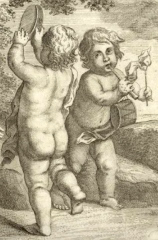 allegorical etching by Wenceslaus Hollar allegorical etching by Wenceslaus Hollar |

 The Harleian Miscellany : or, A collection of scarce, curious, and entertaining pamphlets and tracts, as well in manuscripts as in print, found in the late Earl of Oxford's library; interspersed with historical, political, and critical notes
by Oldys, William; Malham, John, 1808
The Harleian Miscellany : or, A collection of scarce, curious, and entertaining pamphlets and tracts, as well in manuscripts as in print, found in the late Earl of Oxford's library; interspersed with historical, political, and critical notes
by Oldys, William; Malham, John, 1808 quoted in 'Popular music of the olden time : a collection of ancient songs, ballads, and dance tunes, illustrative of the national music of England : with short introductions to the different reigns, and notices of the airs from writers of the sixteenth and seventeenth centuries : also a short account of the minstrels' by Chappell, W. 1859
quoted in 'Popular music of the olden time : a collection of ancient songs, ballads, and dance tunes, illustrative of the national music of England : with short introductions to the different reigns, and notices of the airs from writers of the sixteenth and seventeenth centuries : also a short account of the minstrels' by Chappell, W. 1859 
 allegorical etching by Wenceslaus Hollar
allegorical etching by Wenceslaus Hollar 


